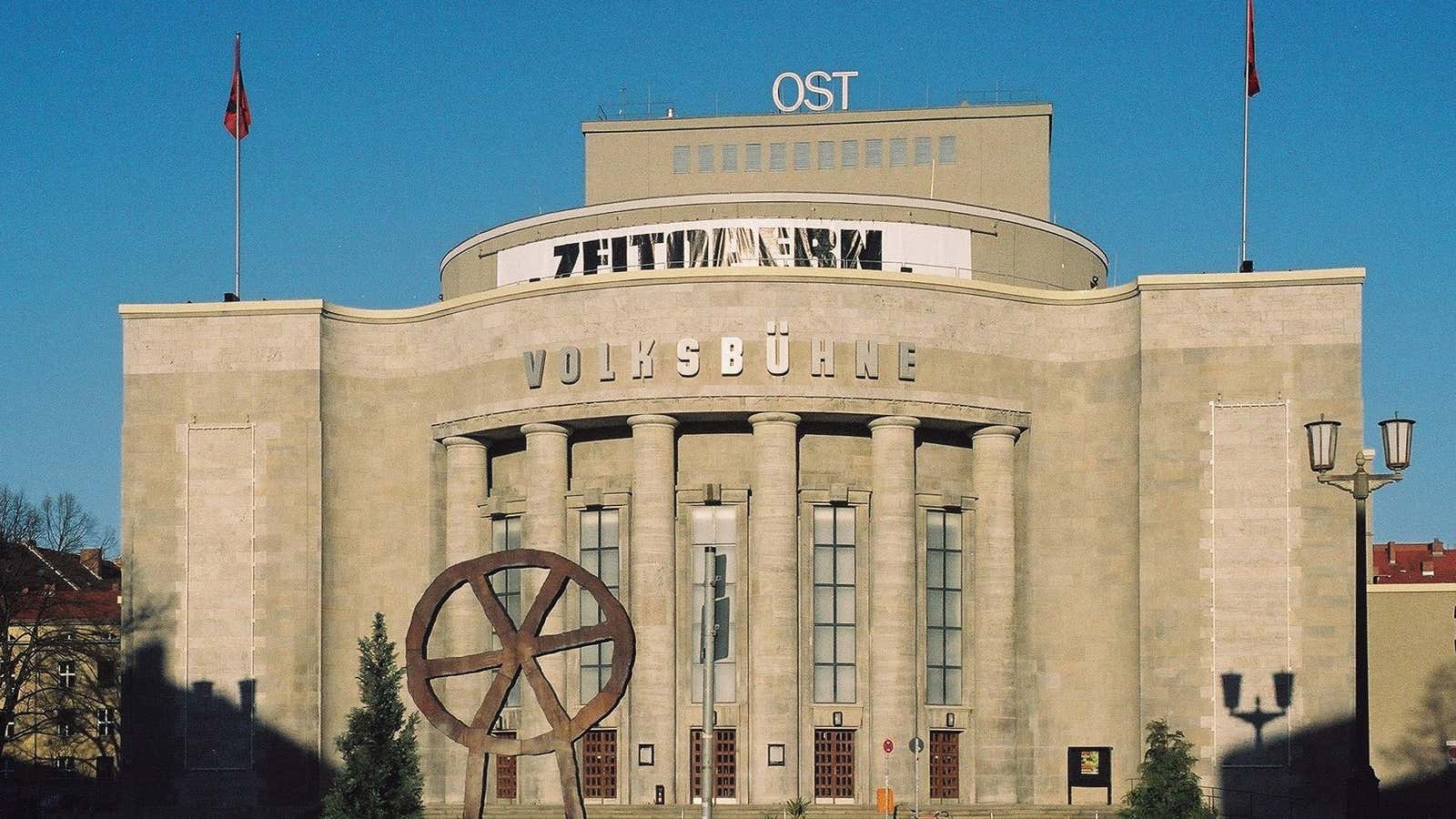Berlin’s identity crisis has reached a boiling point.
An artist collective called From Dust to Glitter took over the Volksbühne theater last weekend in an effort to save the iconic venue’s radical, avant-garde spirit from what they see as an existential threat: Volksbühne’s new Belgian director, they believe, is turning the so-called “people’s theater” into a soulless, commercial space. Since, other protesters have joined, and they now number in the hundreds.
In a Sept. 22 statement, From Dust to Glitter explained that their city’s identity is at the heart of the occupation:
In the 1990s, almost anarchic conditions prevailed in Berlin, but these did not diminish our quality of life. They were a condition for the development of cultural diversity. But the potential evaporated….
Berlin is today a path that other European cities have already embarked on: a path of repression, a path of exclusion, a way of breaking down all feeling of community.
The Volksbühne, opened in 1914, is one of Germany’s most important cultural institutions. It was founded as a theater for populist productions, once touting the slogan “art to the people” on its edifice. Today, it’s known for experimental, provocative political theater productions and ticket prices accessible to the working class.
The German news outlet The Local reports that From Dust to Glitter started gathering last Friday (Sept. 22). They invited the public to join the protest and bring supplies such as toilet paper, food, and booze. At at least one point, the group swelled to 3,000 people. From Dust to Glitter say that they plan to squat inside the Volksbühne for three months. They plan to convene something the call the “People’s Stage,” which they say will act as a round-the-clock anti-gentrification center or “parliament of the homeless,” with parties, readings, and free performances.
A curator who goes by the name Sakrowski describes the atmosphere at the Volksbühne as “open and engaged…a pure explosion.” “This is an expression from people that think there is something going wrong in this city,” he says. “They used the moment to express this.” Sakrowski, who founded the Panke Gallery, explains that the collective angst about Berlin’s gentrification has been brewing for a while. “I think this city has still the potential to be an open space for culture and art. I think this is an important discussion before the city changes to place of empty speculation like London, San Francisco, or Paris.”
Over the last decade, many of the city’s vibrant pockets for “alternative culture” have been replaced by clean, foreigner-friendly neighborhoods. Thousands of immigrants flock to Berlin every year, resulting in rising rents and a perceived loss of authentic Berliner culture.
Belgian art historian Chris Dercon’s appointment to become Volksbühne’s director, first announced in 2015, has heightened these worries. Critics point to his previous tenure as director of London’s Tate Modern as proof that Dercon is more focused in attracting jet setting theater aficionados instead of locals. In June 2017, Dercon fired Frank Castorf, the champion of experimental, “postdramatic theater,” who had been working at the Volksbühne for 25 years. Last year, 180 German theater directors, actors, and stage designers wrote an open letter expressing their concern about Dercon’s bourgeois taste. “This change represents historical leveling and razing of identity,” the write. “The artistic processing of social conflict is displaced in favor of a globally extended consensus culture with uniform presentation and sales patterns.”
Dercon has denounced the protesters’ methods, calling the occupation disruptive and dangerous. “We in no way condemn the occupiers, and their social and policy issue, which are important for Berlin,” said Dercon to the Guardian. “But we condemn the irresponsible way in which they swooped in the building…they position themselves above our artists and their work with an unprecedented arrogance.”
